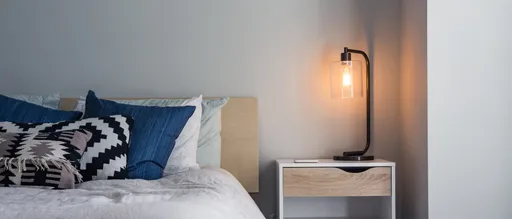“Put your thoughts to sleep, do not let them cast a shadow over the moon of your heart. Let go of thinking.” ~ Rumi

A Fifth of the United States Suffers from Sleep Disorder
Between 30% and 48% of older adults suffer from insomnia, and about 70 million people in the United States suffer from a sleep disorder. That’s over a fifth of the overall United States population!
We need to become a society that prioritizes sleep rather than bragging about how we can operate with little sleep.
People may be able to get away with little sleep for but a time, but the long-term effects are damaging.
Taking time to care for oneself properly begins by prioritizing sleep.
If we don’t prioritize our sleep, we will start to decrease our ability to function, think, and interact with others at an optimal level. Slowly, inadequate sleep over time can destroy us.
If you are reading this article, you are likely looking to improve your sleep and make it a priority!
Here are nine proven tips you can do to improve your sleep. We will go into further detail about each through the article:
- Don’t exercise four hours before going to bed.
- Don’t eat three hours before going to bed.
- Don’t drink two hours before going to bed.
- Don’t look at screens one hour before going to bed.
- Limit alcohol intake.
- Don’t take naps after 2 pm.
- Take a warm bath or shower.
- Take time to wind down.
- Make your room cool.
9 Proven Tips for Getting Better Sleep
1. Don’t exercise four hours before going to bed.
By keeping yourself from exercising past the four-hour mark, you will give yourself more time to relax.
Your heart rate will not be as spiked, and you will give yourself adequate time to begin to wind down.
2. Don’t eat three hours before going to bed.
Keeping yourself from eating three hours before bed will allow your body to digest food.
Eating beyond the three-hour mark will put your body in overdrive. Instead of resting, it will be working throughout the night, digesting food. This hinders sleep.
Make sure to have your last meal (and dessert) three hours before bed.
3. Don’t drink two hours before going to bed.
By not drinking anything two hours before bed, you will have a greater chance of not waking up to use the restroom throughout the night.
Be sure that your last intake of liquids before the two-hour mark is water. Maintaining hydration before the two-hour mark will keep you from wanting to drink something before going to bed, and you will feel more comfortable having adequate water in your system.
4. Don’t look at screens one hour before going to bed.
Our brain interprets blue light emitted from our screens similarly to looking into the sun.
Our bodies may be tired, but if we look at screens to the point of falling asleep, our brain gets confused as to whether it is time to sleep or remain awake.
Take time to set yourself up for success by planning on journaling, reading, or some other light activity within an hour of going to bed.
Seek to be disciplined with not looking at screens and watch your sleep improve!
5. Limit alcohol intake.
The National Library of Medicine gives great insight to the damaging effects alcohol has on sleep. They write:
“Alcohol acts as a sedative that interacts with several neurotransmitter systems important in the regulation of sleep. Acute administration of large amounts of alcohol prior to sleep leads to decreased sleep onset latency and changes in sleep architecture early in the night, when blood alcohol levels are high, with subsequent disrupted, poor quality sleep later in the night. Alcohol abuse and dependence are associated with chronic sleep disturbance, lower slow wave sleep, and more rapid eye movement sleep than normal, that last long into periods of abstinence and may play a role in relapse.”
Don’t allow alcohol to interrupt sound sleep. Try and keep yourself from drinking close to going to bed or, if able, 3-4 hours before going to bed.
When drinking, do so in moderation. Aside from drunkenness, too much alcohol will act as a sedative throughout the night. You will think you slept well when you were waking up repeatedly throughout the night.
If you drink alcohol before going to bed and constantly wake up tired and groggy, this could be one of the reasons for not feeling energetic in the morning.
6. Don’t take naps after 2 pm.
Taking naps after 2 pm can interrupt good sleep.
Naps are fine but in moderation. According to the National Sleep Foundation, “Helping you feel refreshed to meet the demands of your day, preparing you for when you may be short on sleep (like when you have to work or study late into the night), and improving your mood and energy level, are all benefits of napping.”
Be sure to monitor how often you are taking naps and why.
A nap can be a great way to boost energy in the latter half of our day, but it should only be done in less than 30 minutes or longer than 90 minutes. Anything in between and one will be waking themselves up in the middle of a sleep cycle (which can lead to grogginess, lack of clarity, and a shift in the mood).
All things in moderation!
7. Take a warm bath or shower.
A warm bath or shower helps bring all the heat to your skin. Once it is released, your body cools, allowing you to sleep better.
8. Take time to wind down.
Don’t overstimulate yourself with work or big projects late into the night.
Time to wind down is essential to getting good sleep throughout the night.
Have worries, deadlines, or concerns about a big project? Write it down.
Taking time to journal 30-60 minutes before bed can help you feel better about yourself and life.
Knowing you don’t need to go to bed trying to remember what needs to be done can help your mind rest. Writing down your worries or anxieties can help release them from your mind.
Writing has many benefits. All you need is paper and a pen.
Take time to journal each night!
9. Make your room cool.
Sixty-five degrees Fahrenheit or cooler is the recommended temperature for sleeping.
Sleep Advisor says, “Sleeping in a cool room can help you combat insomnia by lowering your body temperature, which then slows down your metabolism rate. As a result, you don’t spend as much energy during sleep, and you’re less likely to wake up in the middle of the night.”
Time to Accelerate Yourself to Improved Sleep
Now that you know the nine proven tips that can lead to better sleep, it is time to evaluate some deeper discussions on specifics of when to sleep, what could be keeping you up at night, and who to see if you are continuing to have sleep problems.
For further reading, view the following articles on:
- What Time Should I Go To Bed?
- What’s Keeping Me Up At Night?
- Who Do I Go to If I Am Having Sleep Problems?
You have what it takes inside you to make a definite choice that will change the future trajectory of your health.
Our team at Tiger Medical has the experience, clinical skills, and coaching acumen to help you get your health and energy back and improve your sleep.
To talk to one of our professionals, click here to schedule your call!



 8min to read
8min to read
 18min to read
18min to read
 9min to read
9min to read